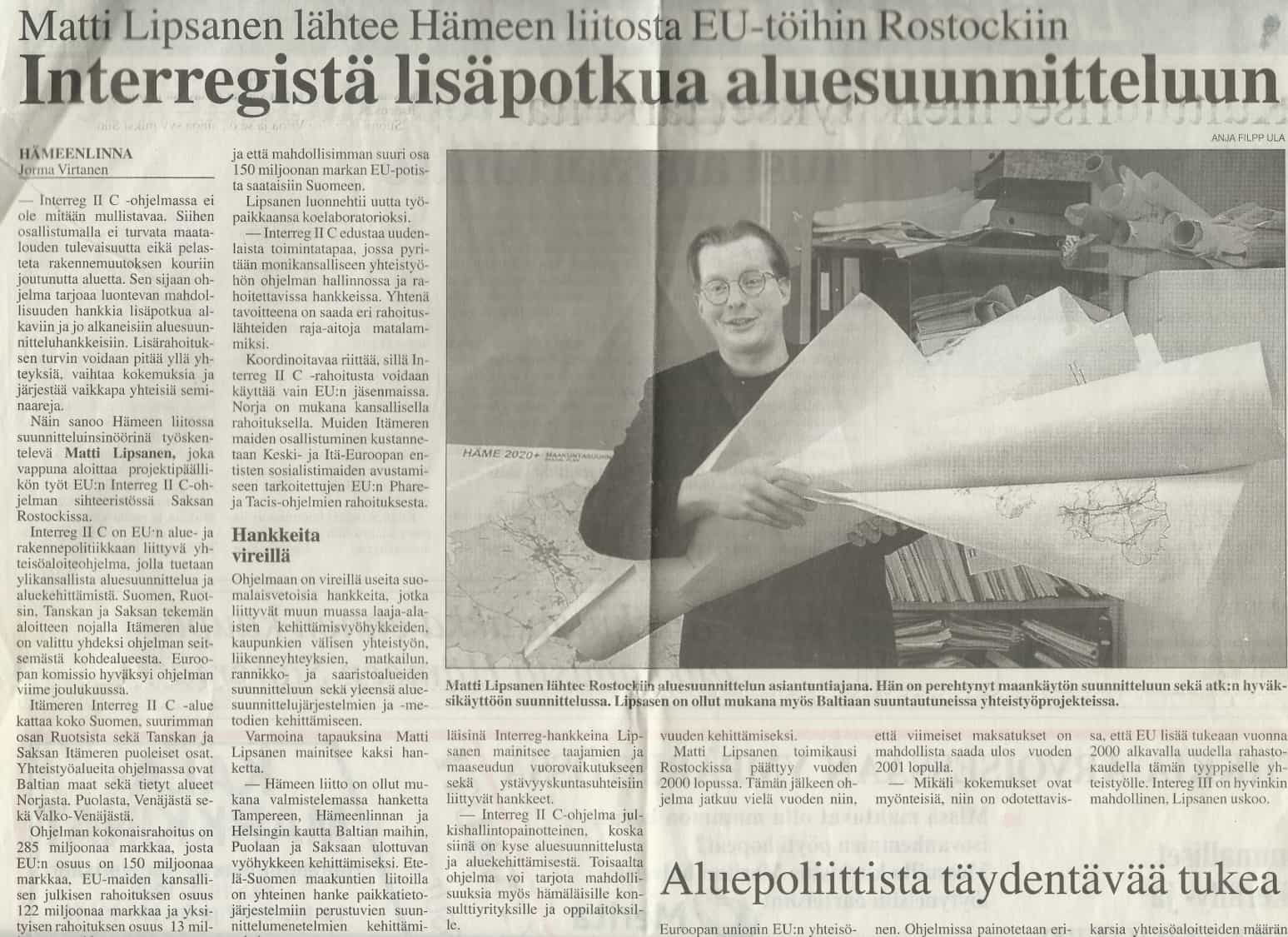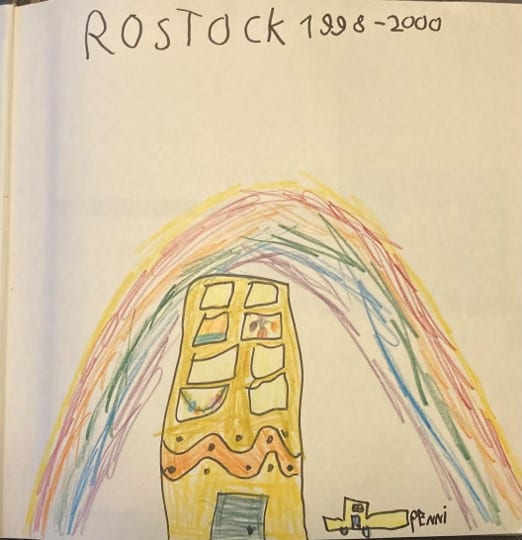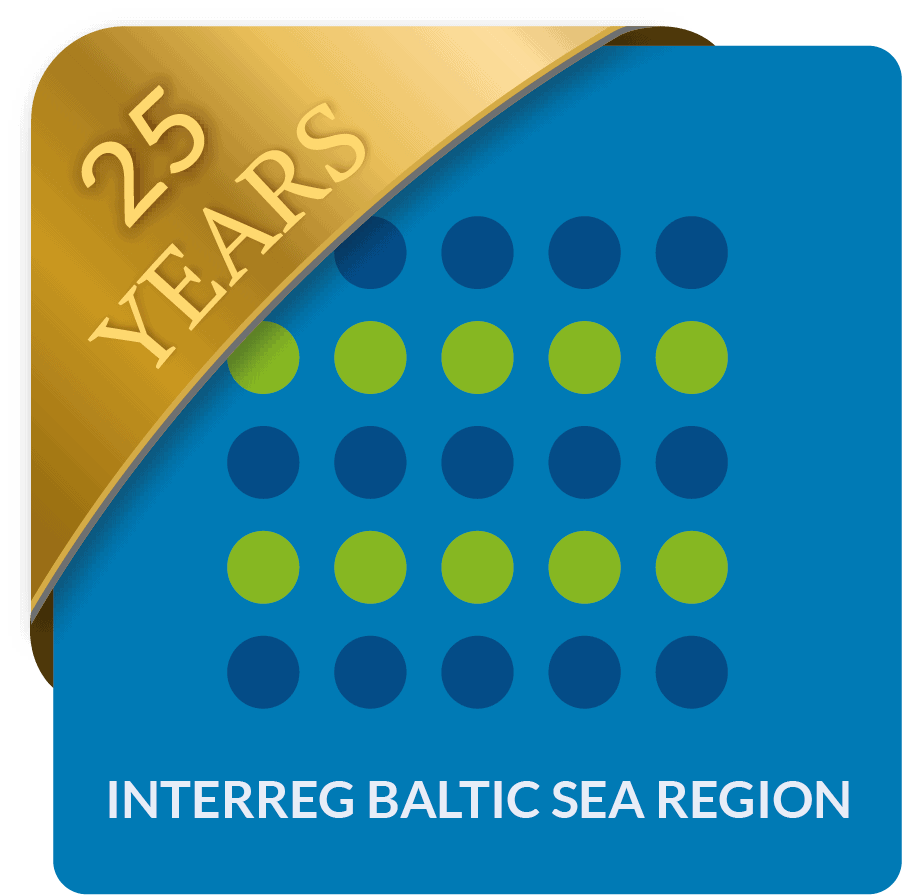
14 March 2023
We belong together: my 25 years with Interreg
Inteview with Matti Lipsanen.
Matti, how did the Interreg journey start for you?
Matti Lipsanen: It was 1998 and the Programme Secretariat in Rostock was newly opened. In those days, it was a small office with just a few people. But there was one position of a project manager earmarked for Finland…
I worked at the Regional Council of Häme in Finland as a strategic land use planner at the time. When you think of it, the Interreg IIC Programme focused on spatial planning and development a lot.
A senior civil servant from Finland was about to fill up the Rostock position but, at the end of the day, he didn’t take it. So I thought: “Does it make sense for me to apply? I am into spatial planning, I know about ERDF financing, and I have some experience with cooperation projects in the Baltic States. I am also quite young but I have two small children, and we just bought a house in Finland…” But my wife was convinced: why not? And to my surprise, I got this job! Susanne Scherrer, the best boss I could ever get, admitted afterwards that she just felt she wanted to work with me.
Do you remember your first day at work in Rostock?
My first day was 4 May 1998. And when I entered the office, there was already a bunch of project applications lying on my desk. They were paper applications so you can imagine the pile. I sat down to read them. My first roommate was Thomas Weber (currently Team Leader Finance Unit). This is how it all started…
I moved to Rostock with my family. My kids were one and four at that time, and they both went to kindergarten nearby. They moved back to Finland in the autumn of 2000 when my older daughter started school.
Matti Lipsanen:
But your Interreg experience didn’t end in 2000; what happened next?
I’ve been related to the Baltic Sea region cooperation ever since 1998, this way or another. I am the man who in fact dedicated his best years to the Baltic sea region cooperation!
When I got back to Finland, to the Regional Council of Häme, I wrote project applications for the new Programme in Rostock. A second try was successful. My project for the next three years was Via Baltica Nordica, which focused on development zones: quite a fashionable concept those days.
After that, I was secretary at the Finnish national subcommittee. Martti Ahokas from the Regional Council of Central Finland chaired the subcommittee for many years. But when he retired, I got elected to be the chair of the subcommittee in 2011. That means that I have been automatically representing the Finnish regions in the Monitoring Committee ever since, in three subsequent programmes. And on top of that, there have been other Baltic Sea region activities, like BSSSC, where the Regional Council of Häme hold the position on the board for a couple of years.
Is there any project that is particularly close to your heart?
Oh, there have been hundreds of those projects, picking one is impossible. But somehow the first projects in the first selection round in 1998 I remember very well. Those projects related to inland waters, and then a rise of projects on innovations. And that’s the fact that I have been highlighting from the Finnish point of view until today: it is not only the coastline or the basin of the Baltic Sea as such but also the inland waters, ground waters, rivers and lakes.

Do you see an evolution in the programmes across these years?
There have been many changes; we started the fifth generation of the programme last year. But you would probably not recognise the first one. You still need a lead partner and partners from at least three countries. And the general idea stayed: to show the added value of transnational cooperation, and to make something tangible and concrete in the region. What is specifically related to the Baltic Sea region? Is cooperation essential to solving this challenge? These questions are still out there.
A big change in the early 2000s was when the Baltic states and Poland became EU Member States. And there was a question of cooperation with Belarus and Russia, which had many different phases. And then in 2014, we started a completely new world when the financing negotiations with Russia took place, you could sense that in the atmosphere. All these things suddenly changed last year.
Can you see any differences in transnational cooperation now and 25 years ago?
I think we were a bit more idealistic in the 1990s; there was a special kind of cooperation spirit after the collapse of the iron curtain. We live in a different world now; things got a bit more pragmatic and definitely more professional. Still, I always talk about the Baltic Sea Region family, and in the family: it is so nice that we came together. That kind of team spirit is still there: we belong together and we want to do things together. This gives me optimistic vibrations also today even if we are rather uncertain about the future.
We are in the green and digital transition. They are only words, but we have lots of opportunities related to them. There are also values that we formulated in autumn 2019 that built the basement of the Programme. It’s so much about making the transition according to the needs of people.
What would be the highlights within those 25 years for you?
First, the enthusiasm in the late 1990s when opening the Programme, when having the first projects – that was something! Then the enlargement of the European Union: when Estonia, Latvia, Lithuania and Poland were sitting around the same table with the rest of us and we made decisions: together. That, I admit, was not easy at the beginning. But we can see today how many projects we have with partners from Poland or Latvia. Another small thing is that private enterprises can now be part of the Programme. We had discussed it from the very beginning of 2000.
Matti Lipsanen:
Our new Programme is in full swing now, would you have any message to the projects and applicants?
Go back to the Programme values and lean on those. Think about what the value is when you work with partners from the Baltic Sea region, and what you can get from this cooperation.
Talking about Rostock where your Interreg journey started: what place does it have in your heart today?
I am a fan of FC Hansa Rostock even after those 20 years. And I visited games every now and then. I think that you feel at home when you cheer for your team, and FC Hansa Rostock is one of them. And I may have the only FC Hansa Rostock Fan facemask in the whole of Finland. I ordered it from a fan shop and I am sure that when packing the order, they were wondering where this Akaa in Finland is. And that’s where I live.
Any places in Rostock you would visit?
I think it was 2008 when I visited Rostock last but I would go to Eschenstraße, the street I lived in, the playground where our children used to go to, and the Joint Secretariat Office in Grubenstraße. Our favourite restaurant doesn’t exist anymore but I would also visit the Rostocker brewery restaurant – I used to take my friends there.

#DidYouKnow
Throughout the year of 2023, we are celebrating the 25th anniversary of the Interreg Baltic Sea Region Programme! We cherish the projects, which brought solutions to the needs and challenges in the region. We cherish the true value of transnational cooperation, and we cherish the people, who have been related to the Programme from the beginning or joined us for just a short time: thank you for shaping the region with us!
We are greater together!
More recent news
Grand results of the first round of small projects!
Despite the winter scenery, the results of 17 finalised Interreg Baltic Sea Region projects are in full bloom! And behind them lie two years of intensive work across borders, mutual learning and inspiration, and connections that last.
Climate-neutral future at hand for Baltic Sea region cities
Turning a city into a climate-neutral one requires knowledgeable people, thorough planning and solid financial resources. But how can cities manage this transition smoothly? The Interreg project Climate-4-Case guides cities around the Baltic Sea on how to do that right.
Designing Interreg Baltic Sea Region that belongs to everyone
10 December 2025 Designing Interreg Baltic Sea Region that belongs to everyone Written by Eeva Rantama What if the next Interreg Baltic Sea Region...
Monitoring the Programme’s progress: transnational cooperation in the making
Representatives from nine Programme area countries gathered in Berlin on 19-20 November 2025 to review the progress of the Programme’s implementation and start preparing for the post-2027 period.






